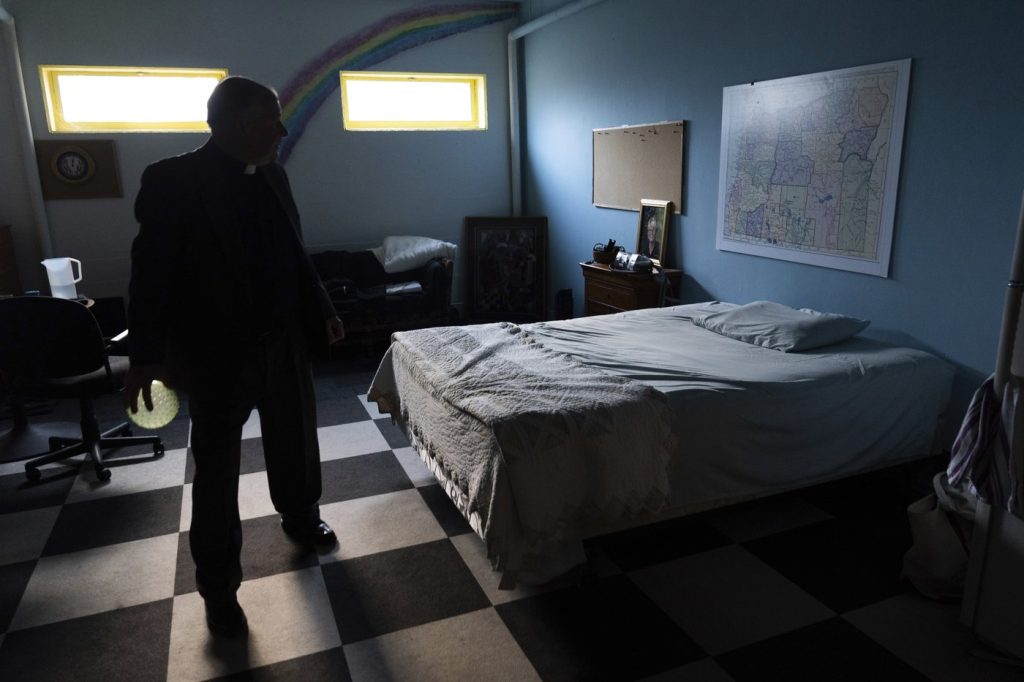Numerous faith leaders across the United States are expressing concern regarding the immigration crackdown initiated by President Donald Trump's administration. This enforcement has reportedly instilled fear within migrant-friendly congregations, prompting clergy members to consider forms of resistance despite warnings that places of worship are no longer considered safe from arrests.
In Portland, Oregon, Rev. W.J. Mark Knutson has announced plans to continue offering sanctuary to undocumented migrants at Augustana Lutheran Church, a practice he previously carried out in 2014. He recounted a specific case where an El Salvadoran man facing deportation took refuge in his church for nearly three months, sleeping under the altar during his initial nights. "Theologically, we’ll stand our ground against the government — an unjust law is no law at all," Knutson stated, emphasizing the sanctity of houses of worship.
Similarly, in Philadelphia, Rev. Robin Hynicka of Arch Street United Methodist Church has reaffirmed his church's commitment to act as a "justice-seeking, reconciling, sanctuary congregation." His church successfully sheltered an immigrant from deportation during the first Trump administration, highlighting the broader mission of extending sanctuary to those in need through equitable policies and enactments.
Other clergy serving undocumented migrants have reiterated their commitment to support, especially after federal immigration agencies announced they could now conduct arrests at sensitive locations such as churches and schools, effectively dismantling prior protections. Rev. Joseph Dutan from St. Paul the Apostle Church in Queens, New York, described the rising trepidation among his congregation, explaining, "More than scary, it’s sad," as many members now feel unsafe even attending Mass due to fears of potential deportation.
Rev. Manuel Rodriguez of Our Lady of Sorrows Catholic Church in Queens echoed these sentiments, mentioning how children of his 17,000 parishioners are experiencing anxiety as they worry about the safety of their undocumented parents. "We have children who are shaking literally and crying," Rodriguez noted, illustrating the emotional toll the policy shift has inflicted on families.
Imam Omar Niass of Masjid Ansaru-Deen in the Bronx has opened his mosque to migrants, including some from Senegal. He emphasized his duty to help those in need, stating, "I cannot leave anyone, Muslim or non-Muslim, to sleep on the street." Expressing confidence in his faith, Niass remarked, "If Trump wants to close houses of worship, but God isn’t pleased, then he won’t be able to do a thing."
Catholic Bishop Mark Seitz of El Paso, Texas, also condemned the policy shift, arguing that it incites fear among community members while they seek God, healthcare, or drop off their children at school. His diocese plans to continue educating congregants about their rights and providing legal services to combat the negative impacts of increased immigration enforcement.
Pastor Maria Elena Montalvo of Grace Evangelical Lutheran Church in Bell, California, is similarly committed to providing sanctuary, as her church has been actively sheltering immigrants, refugees, and asylum seekers for the past seven years. Montalvo, who immigrated from Mexico in 1989, stated, "People are afraid to go to work, to school, to live their lives freely because they are afraid of being arrested or deported," underscoring the pervasive anxiety in her community.
In Los Angeles, Rev. Canon Jaime Edwards-Acton has initiated the Sanctuary Task Force again, focusing on educating migrants about their rights amidst the current climate of uncertainty. Although lacking a definitive plan, he mentioned that immediate actions, such as providing groceries for scared congregants, are already underway.
David Hollenbach, a Jesuit priest and Georgetown University professor, remarked on the historical precedent of religious communities serving as sanctuaries for vulnerable individuals. "To violate that is also a very serious issue," he said, referencing Jesus as a refugee and the moral imperative to assist migrants and strangers.
Among evangelical leaders, reactions varied. Rev. Robert Jeffress, a staunch Trump supporter, argued against the notion of sanctuaries being above the law, while Brent Leatherwood, president of the Southern Baptist Convention's public policy arm, remarked that the policy shift only creates confusion, potentially discouraging law-abiding immigrants from attending churches.










